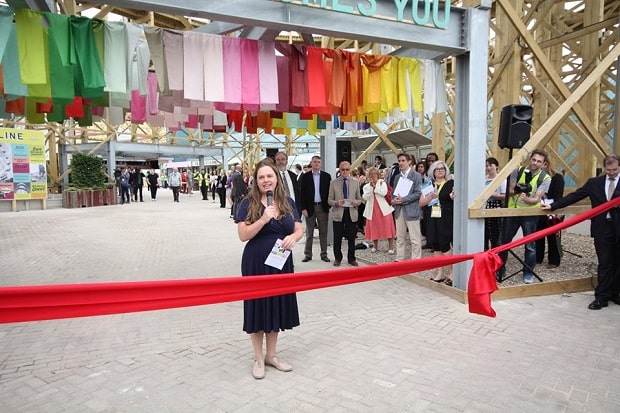
A report highlighting the need for improvements to transport, housing and broadband and better access to further and higher education for young people in seaside towns has been published by a House of Lords committee whose members visited Margate last year.
Five members of the Select Committee on Regenerating Seaside Towns and Communities visited Margate in September. The cross-party peers were conducting an inquiry into the complex challenges faced by seaside towns and communities and requested a visit to Margate as part of their evidence gathering.
Members of the committee met with senior councillors and officers from the council as well as people from the public sector and representatives from local businesses. They were also given a tour of ongoing projects including the ‘Live Margate’ Housing Intervention Programme , the Multi-Agency Task Force and Dalby Square regeneration and visited Turner Contemporary and Dreamland.
The resulting report, The Future of Seaside Towns, puts forward ideas for improving seaside areas, including a suggestion to introduce coastal ‘enterprise zones’ to encourage economy growth.

In the report Dreamland and Turner Contemporary are highlighted as successful regeneration projects and reference is made to the growth of creative industries in Margate.
Referring to the success of both Dreamland Margate and Turner Contemporary, the report stated: “The emerging arts and cultural scene is having a significant impact on sustaining these two assets in the town and will continue to drive (new) audiences. This follows a long-term strategy for creative and cultural-led regeneration in Margate.”
The Committee report says other towns should follow the example of arts-led regeneration.
Thanet’s visitor economy has grown 9.2% since 2015 to the value of £319million, with an extra 4.2million visitors in 2017.

Dreamland CEO Eddie Kemsley welcomed the findings of the report, saying: “Margate remains a benchmark for other seaside towns in terms of what collaborative, arts and leisure-led regeneration can achieve, and we are extremely proud to be part of the story. We welcome this report and the acknowledgement of Dreamland Margate’s impact on the district’s growth and success.
“There is still work to be done and there is a lot of pressure facing local authorities. The onus is on private sector partners like us to forge partnerships and work with the public sector, local businesses and the education sector to ensure our town has a year-round offer for both visitors and residents.
“Seaside towns cannot focus only on the summer peaks – there must be a year-round offer. This is the goal for Dreamland, as we work towards a full 12 month offer with numerous events planned throughout the year plus our award-winning Halloween event, Screamland, and a brand new Christmas event planned for 2019.
“We’ve also just hired 200 seasonal staff to support our summer season and with our increased events offer, we hope to keep providing more job opportunities throughout the year.
“In Margate, it is important that we regenerate not gentrify. We must also include tertiary education in conversations and initiatives, so the next generation feel invested in their town’s future – and feel they have a place in it.”
Housing issues
Issues surrounding Houses of Multiple Occupation and a transient and vulnerable population placing additional pressure on local services were raised by groups including the Ramsgate Coastal Community Team.
The team stated that population transience in the area was “largely the result of London boroughs relocating applicants for social housing away from support networks.”
The Coastal Communities Alliance outlined the impact that this practice has and suggested that local authorities lacked the resources to manage the pressures that population transience may cause: “Compounding the effects of coastal deprivation is the local authority funding formula that does not cover the costs generated by transient populations, looked-after children, mental health issues, homelessness, housing benefit dependence and worklessness.
“Overstretched service budgets can undermine efforts and the resources available for community engagement, developing attractions, stimulating business growth and engaging in the costly uncertainty of inward investment promotion.”
Thanet council also highlighted that 75% of private sector tenants in Cliftonville are in receipt of housing support and told the committee that selective licensing was on tool used to tackle rogue landlord issues.

Included in the submission from Thanet council was evidence supplied by Thanet Summer Kitchen boss Sharon Goodyer.
Sharon, along with Labour councillor Barry Lewis and Drapers Mills head teacher Joe Manclark, detailed what the Summer Kitchen project had achieved through its free meals and activities scheme and highlighted the need for more community support as well as the issues faced by Dane Valley residents.
The Lords committee report concluded coastal towns need better digital connectivity, improved access to further and higher education, landlord incentives to improve housing, better transport connections and local strategies to improve work skills.
It also highlighted The UK Shared Prosperity Fund, which is set to replace EU funding after Brexit, as an important opportunity to help support coastal business development, and to tackle deprivation.
A suggestion for coastal Enterprise Zones is also made.

